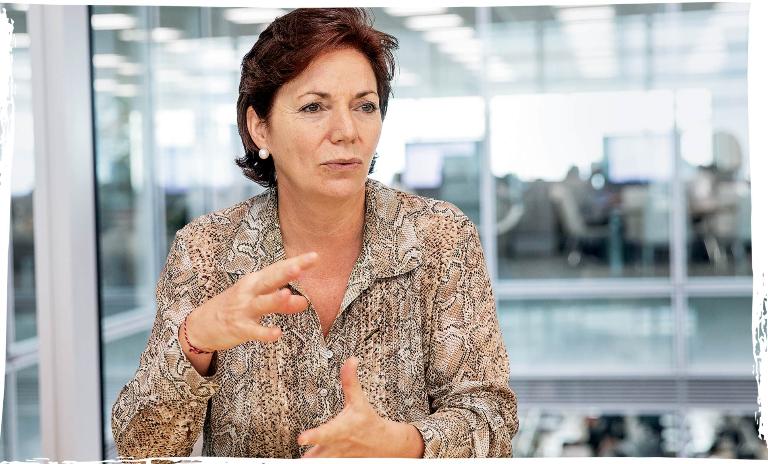Breaking the rules
![{[downloads[language].preview]}](https://www.rolandberger.com/publications/publication_image/Think_Act_Magazine_Breaking_the_rules_Cover_download_preview.jpg)
Is breaking the rules a crucial skill? We examine how the people who have made their own rules also significantly shaped the world of business.



Catherine Perez, senior executive in charge of Nissan's new technology collaborations, is on a mission to make mobility simple and accessible. Here, she talks to Think:Act about the challenges on the road ahead.
The way we think about mobility and the way we use vehicles is changing. Traditional car ownership is making way for new ideas like car-sharing and ride-hailing while more and more of the driving experience behind the wheel is automated or assisted by AI. Advances in digital technology, connectivity and the internet of things mean that the dream of autonomous vehicles could be just around the corner. A car will no longer be just a tin box to get you from A to B, but a digitally connected space that avoids traffic jams, parks itself and leaves its occupants free to get on with whatever they want, be it working, socializing or relaxing. At the same time, the industry is being challenged to reduce its environmental impact. Is e-mobility the answer, is the technology ready and what will it take for widespread uptake of electric vehicles?

One person seeking the answers to all these challenges is Catherine Perez, corporate vice president, corporate strategy, partnerships and business development at Nissan. After 20 years in the industry, she is now leading the search for future-proof solutions. The key, she says, is in collaboration. In the search for answers to changing needs, automobile makers are collaborating not just with each other but with businesses in other sectors that have the know-how and expertise they need to deliver what customers want. As a company with a long history of forging alliances, Nissan is well placed to take this new route. And as one of the few women in a senior leadership role of what is, still today, a male-dominated industry, Perez is at the heart of these changes.
The automotive sector still attracts more men than women. What attracted you to it?
It's a mix of all the things I love: technology, know-how, design capability and creativity. It is also an extremely swift-moving business with strategic decisions and alliances and it's very international. At least, it has unfolded gracefully like that over the last 20 years. Ahead of us, however, we face a real revolution, which makes me particularly happy to still be in this industry today.
"Innovation has to be simple and intuitive. My test is: Is it as good as my smartphone? If not, it's not good enough."
You are one of only a handful of women in a top leadership role in the industry. What does it require to succeed as a woman in the automotive sector?
The answer is the same whether you are a man or a woman: You need a fighting spirit and you have to like constant challenge.
You said the industry is facing a revolution. What sort of changes are underway?
Remember what a cell phone was like 20 years ago? It was for making calls. Now it does a million other things. Exactly the same kind of change is ahead of us for the car. For example, in China, the most recent models offer a level of connectivity that means the driver and passengers do not use their phones to do what they need, but instead use the car's own connectivity – whether it's arranging a meeting, calling their mother or ordering a pizza. Like the mobile phone, the car is undergoing a similar revolution in terms of how we use it.
In this fast-changing sector, what are Nissan's objectives?
Our goals are zero emissions, zero fatalities on the road and more autonomous, electrified and connected cars. There is an appetite for these things in developed as well as developing countries and the latest technology makes it possible for us to meet that need. I can make the comparison again with phones. Forty years ago, people thought that phones would never be widespread in Africa because the infrastructure would never be built. Mobile phone technology has created a shortcut, making it possible to have these services without first building the infrastructure. In the same way, we are now able to meet the appetites for vehicles with connectivity in different parts of the world.
To what extent does the future of the automobile industry depend on ecosystems of collaborators?
We have to collaborate because mobility services are not derived from the traditional car industry but are an addition to it. It requires a different kind of know-how and if we want to have immediate access to this know-how – and time is of the essence – collaboration is the way to do it. Collaborations can be technical participations, agreements or take whatever form you want – it doesn't matter how you decide to do it, but you must do it, because our world is expanding to serve the multiplicity of needs of our customers globally.
What is your approach to looking for businesses to collaborate with?
I am looking for anything related to autonomous driving, connectivity or the electrification of our cars. As for the question of how these challenges will be met – I need to be open to different solutions and different types of collaboration. A lot of innovation comes through startups and it's impossible to imagine what they will come to us with. That's why we have a partnership with the startup accelerator Plug and Play Japan. They do the scouting and preselection for us. I never know what is going to be presented, but I don't think that matters as long as it serves our objectives – to offer the best possible service and products to
our customers in line with what we call "Nissan Intelligent Mobility."
What does that mean?
We want to redefine how cars are driven, powered and integrated into society with the goal of moving toward zero emissions and zero fatalities on the road. That's the technology roadmap to serve our customers and drive them to a better world. In terms of collaboration, what matters is the spirit in which you do it. It has to be a win-win approach, with the aim of serving customers with something different and better than is on offer elsewhere.
Catherine Perez worked for Nissan in Paris and Tokyo before becoming head of purchasing in North America. Now the head of corporate strategy, partnerships and business development, her role is finding new collaborators to help the company meet the challenges of the future.
How do you go about embedding technology into your vehicles?
The key is to do it in a user-friendly way. I'm not interested in the details or the beauty of the technology if I can't work out quickly how to use it. I am never more frustrated than getting into a new car and not being able to select a radio channel. Innovation has to be simple and intuitive. My test is: Is it as good as my smartphone? If not, it's not good enough. I want to know very concretely what it means in terms of ease of life.
Looking ahead to 10 years from now, how will mobility change?
The biggest change will be the possibilities that you will have for getting from one place to another. If you are going on vacation with the whole family and the family pet, you will take one type of transportation. If you are going to the airport, you will take another type. People have multiple travel needs. We have to address those different needs in a more nuanced way. That's why the breadth of offer will expand. In fact, it already is expanding.
What has supported you the most in achieving your career ambitions?
A number of people in the company have inspired me or have been my mentors, including a few women leaders. They allowed me to take bigger responsibilities and opened up challenging positions for me. It is a mix of inspiration and aspiration that they gave me. I've been lucky enough to find that in the company, probably because it is in the DNA of Nissan to nurture diversity.
Are you optimistic that there will be more women in leading roles in the industry in the future?
I see a lot that is very encouraging for the future. There is assertiveness and self-confidence already in the younger generation, which is a very good thing. Nevertheless, areas dealing with future technologies continue to attract few women. We have to change that. We should have more women in artificial intelligence, in engineering and in coding, because this is going to shape the future. If we don't have diversity in terms of how these technologies are designed, then we will not be able to fully address the diversity that exists among customers. That is paramount.
What advice would you give young women starting out in their careers?
Stick to who you are because other people perceive authenticity and sincerity. Also, show commitment and a willingness to be challenged, to be outside of your comfort zone. Fortunately, we are entering an era where there is room for new generations not to mirror other people's models but to be who they are. They have to take that opportunity.


![{[downloads[language].preview]}](https://www.rolandberger.com/publications/publication_image/Think_Act_Magazine_Breaking_the_rules_Cover_download_preview.jpg)
Is breaking the rules a crucial skill? We examine how the people who have made their own rules also significantly shaped the world of business.
Curious about the contents of our newest Think:Act magazine? Receive your very own copy by signing up now! Subscribe here to receive our Think:Act magazine and the latest news from Roland Berger.
